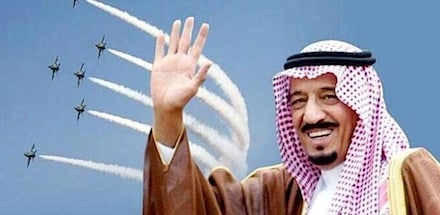President Barack Obama’s visit to Saudi Arabia on Wednesday has boomeranged. His good intentions were never in doubt – mend fences between the two countries. But what emerges is that it will need much more than one visit – maybe, even one full presidency cannot fulfill such a mission. According to Prince Turki al-Faisal, former Saudi intelligence chief, all the King’s horses and all the King’s men cannot put Humpty Dumpty together again.
Turki told CNN’s Christian Amanpour that there is going to have to be “a recalibration of our (Saudi) relationship with America. How far we can go with our dependence on America, how much can we rely on steadfastness from American leadership, what is it that makes for our joint benefits to come together. These are things that we have to recalibrate.”
He then added, “I don’t think that we should expect any new president in America to go back to, as I said, the yesteryear days when things were different.”
When a close longstanding relationship unravels, it is always a painful sight to watch, leave alone experience. Obama experienced a humiliation in Riyadh that has probably no parallel in recent international diplomacy. He was received on arrival in Riyadh on Wednesday by a relatively less important Saudi functionary – the governor of Riyadh. To make the humiliation complete, King Salman made it a point to be present at another part of the tarmac, to receive personally the GCC leaders who were also trooping into Riyadh at the same time — to meet Obama. The Saudi state television altogether ignored Obama’s arrival in Riyadh.
Of course, Obama is unsentimental about personal ties with foreign statesmen, and his eagle’s eye for securing the US’ interests will be quite willing to overlook such awkward moments in protocol. He, in fact, pretended not to notice Salman’s snub – and furthermore, after the talks in Riyadh he kept insisting that the visit brought greater consensus between the US and its GCC allies.
Obama counted on finger tips the areas where the consensus exists – fight against the Islamic State and terrorism, Syria and Iraq, Libya, Yemen. Obama even voiced appreciation for the helpful role by the GCC in the negotiations leading to the Iran nuclear deal. Nonetheless, all the perfumes of Arabia cannot still erase the stink of Salman’s snub to Obama. (White House transcript)
The point is, the US-Saudi discord now goes far far beyond issues of geopolitics – Iran’s rise, America’s dependence as ally, energy politics, US’ ambivalence over ‘Arab Spring’, Syria and so on. The relationship is breaking over those fateful ’28 pages’ which still remain classified in the investigation report on the 9/11 attacks on New York and Washington. Read the stunning transcript of the CBS NEWS item on the ‘28 pages’ to comprehend what is at stake. (here).
The clock is ticking. Obama has to take the fateful decision in June whether to allow the 28 pages to be declassified. His own instincts seem to favour such a move. And he is also coming under the pressure of public opinion. Yet, he dithers as he is unsure how, where or when American interests (and lives) will be jeopardised if the US-Saudi relationship cracks. Indeed, the Saudis have made it known that there will be hell to pay.
Maybe, it is bluster, but, importantly, maybe it is not. For sure, this becomes a strategic call for Obama. But, on the other hand, Americans are increasingly asking searching questions about Saudi Arabia’s role in promoting terrorism and its variant of Islam. This is a new experience for both Washington and Riyadh, because the powerful Saudi lobby in the US, which traditionally was the opinion maker in the corridors of power, is being bypassed. And the US courts are hearing the families of the 9/11 victims. Even a right wing politician such as former New York mayor Rudy Guiliani who was a great friend of the Saudi princes has distanced himself. (here)
However, the conventional wisdom still is that the US-Saudi relationship is not about to disintegrate. The CNN used the metaphor of an unhappy marriage “in which both sides, for better or worse, are stuck with each other.” There is much to be said in favor of such a cautiously optimistic interpretation, because of the matrix of ‘petrodollar recycling. (For the uninitiated, there is an amazing book on the subject titled The Hidden Hand of American Hegemony: Petrodollar Recycling and International Markets authored by the renowned academic Prof. David Spiro who taught at Columbia and Harvard.)
But, on the other hand, it is going to be extremely difficult to weave a new fabric of shared interests between Washington and Riyadh if the push comes to shove over the 28 pages and the culpability of members of the Saudi royal family in the 9/11 attacks surfaces. Indeed, all indications are that the battle lines are being drawn slowly, steadily, with a large bipartisan group of Senate and House lawmakers having backed a bill that would allow families of the 9/11 victims to sue foreign states if they helped fund or support a terrorist attack on US soil. It is an unmistakable sign of the stormy times ahead that the bill has drawn the backing of both Democratic presidential candidates Hillary Clinton and Bernie Sanders, and that it is, in fact, co-sponsored by GOP candidate Ted Cruz.
Reprinted with permission from Indian Punchline.


